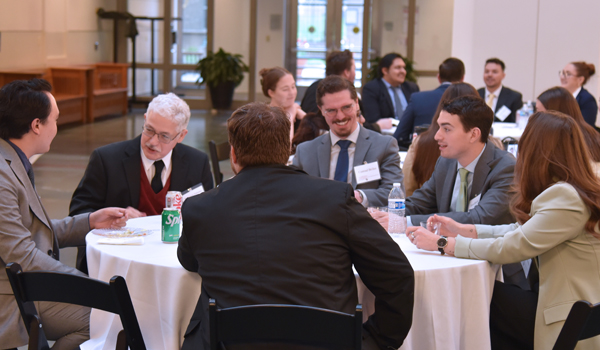On April 11, 2025, the Journal of Law & Technology (JLT) hosted its annual symposium, titled "Space – The Final Frontier? The Challenges and Opportunities of Space Exploration and the Law." This event provided a timely and insightful examination of the legal complexities surrounding space exploration. With international and domestic laws intersecting in areas such as property, tort, and environmental regulation, the symposium explored how these challenges are currently managed and how they may evolve in the future.
Keelin Ferris, Chief Editor of JLT, and Alexandra Van Cleef, Lead Article Editor of JLT, opened the event by welcoming attendees and outlining the agenda. The day featured two dynamic panel discussions moderated by Van Cleef, interspersed with a networking luncheon.
The first panel, The Structures of Space Law, brought together distinguished experts to discuss the current legal frameworks governing space activities and the challenges of filling gaps within the complex structures of the laws of Space. The panelists included:
- Professor Antonio Perez, The Catholic University of America Columbus School of Law
- Audrey Allison, Senior Policy Analyst, Aerospace Center for Space Policy and Strategy
- Dr. Michael Conklin, Professor, Texas A&M

The second panel, The Future of Space Law, explored the trajectory of space legislation and its implications for the industry, both from the legal and policy perspective. Panelists included:
- Trevor Hehn, Attorney, Hehn Law
- Jessica Noble, Space Industry Attorney
- Chase Hamilton, Associate, Akin
 The symposium concluded with closing remarks from Keelin Ferris, who reflected on the legacy of the Journal of Law & Technology. She honored its origins within the Communications Law Institute (now the Law & Technology Institute) and its original publication, CommLaw Conspectus, founded by Professor Emeritus Harvey Zuckman, whose contributions were remembered following his passing in November.
The symposium concluded with closing remarks from Keelin Ferris, who reflected on the legacy of the Journal of Law & Technology. She honored its origins within the Communications Law Institute (now the Law & Technology Institute) and its original publication, CommLaw Conspectus, founded by Professor Emeritus Harvey Zuckman, whose contributions were remembered following his passing in November.
This thought-provoking symposium underscored the critical role of legal frameworks in shaping the future of space exploration, providing valuable perspectives for both the academic and legal communities.
